Thanks for the Feedback: The Science & Art of Receiving Feedback Well
by Douglas Stone & Sheila Heen
This book is easily one of the most practical and concise sources of knowledge about feedback – an icky, tricky thing for most people (and unpleasant at best) – especially if we are on the receiving end.
The writing is easy to read – plain and never more sophisticated than it needs to be – yet substance is high. This pairing of qualities is something I value in books.
Another quality I enjoy about this book is how little filler there is. The content hits the ground running by sorting feedback into three types: Appreciation, Coaching and Evaluation. These distinctions do much to demystify this obscure thing called feedback and quickly goes on to show how the feedback process often degenerates into an unpleasant event simply because the giver and the receiver are not aware of which type of feedback the other is expecting. The first half of the book is spent on each type’s definition and usage. Again, it’s highly practical with little fillers; there are also scenarios that give real-life context to what is being taught.
Peppered throughout are communication techniques that the authors thoughtfully included at all the right places. I found a few gems and numerous reminders in this area.
The second half of the book is almost entirely focused on self-awareness and the interpersonal intricacies of feedback conversations. I went through this part a lot more quickly, but that’s only because this territory is extremely familiar and comfortable for me. I imagine that this second half will be as insightful as the first for another reader, as everything covered here is in the support of feedback giving and receiving.
As a business leader, this book has helped me to have feedback conversations with my colleagues that are both gratifying and truthful; I say this also as the receiver, when they give me feedback. As a coach, it’s another dimension in which I can help my clients achieve clarity in their communties.
I highly recommend this book, as feedback is bound to be something that we all have to grapple with. If you’re in a hurry, read at least the first half. You will already have plenty to put to practice.

